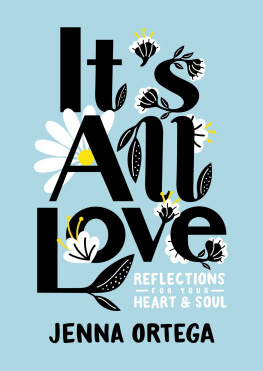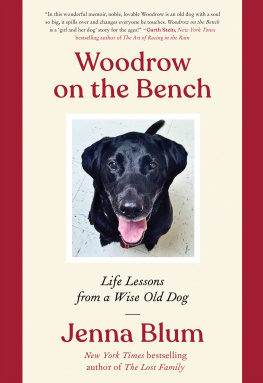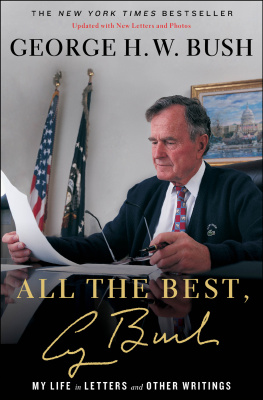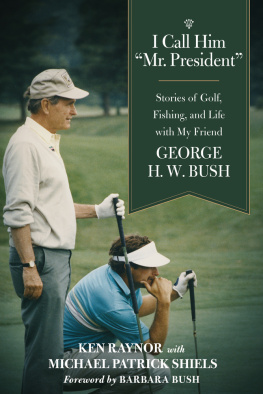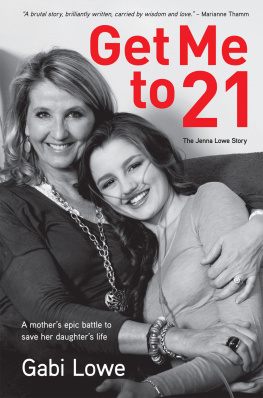At my paternal grandparents house in Maine, on the back of every door my grandmother posted a typed page of house rules. With seventeen grandchildren and eight great-grandchildren running around, my Ganny, First Lady Barbara Bush, wanted to make clear what she expected of us. These rules were simple, practical guidelines for keeping the house running smoothly, but they also taught us respect.
Dont track in sand.
Hang up your towel.
Tell us if youll be eating dinner out.
Make your bed.
My grandfather, President George H. W. Bush, whom I called Gampy, had a list of guidelines for us, too. They were words of advice for living a life of passion and meaning, their humility and kindness as familiar as the loop in the cursive of his handwriting.
Dont get down when your life takes a bad turn.
Dont blame others for your setbacks.
When things go well, always give credit to others.
Dont talk all the time. Listen to your friends and mentors and learn from them.
Dont brag about yourself. Let others point out your virtues, your strong points.
Give someone a hand. When a friend is hurting, show that friend you care.
Nobody likes an overbearing big shot.
As you succeed, be kind to people. Thank those who help you along the way.
Dont be afraid to shed a tear when your heart is broken or because a friend is hurting.
My maternal grandparents dont have airports or schools named after them. Jenna and Harold Welch, whom I called Grammee and Pa, worked as a housewife and a home builder. They never posted rules on doors. And yet I watched them live by their own codes, and I learned from them.
Dont be intimidated by people who have a better education or more money. Kindness is more valuable than any fortune.
Smile at every baby you see.
Regardless of what you do, be proud of working hard to take care of your family.
Read widely.
If anyone spills something, yell Happy days! It reminds everyone not to sweat the small stuff.
Get out of bed to go look at the starsand always, always wish upon the first star you see.
My Pa left us in 1995 after a struggle with Alzheimers, but all three of my other grandparents have died in the past thirteen monthsmy Ganny on April 17, 2018; Gampy on November 30, 2018; my Grammee on May 10, 2019.
I know how fortunate I was to have them for so long. And yet the knowledge that they had long, happy lives did not make the goodbyes any less sad. This year has been one of the most profound of my life, full of both glorious love and terrible loss.
Consolation has come from sharing their words and stories with family, friends, and anyone else who will listen. Ive learned so much from the examples set by all four of my grandparents, and Im lucky that they were all prolific letter writers. I find solace in rereading the letters they sent me over the years; I share my favorites in this book.
In the midst of grief, life has continued. My husband, Henry Hager, and I have two little daughters, Poppy and Mila, now four and six. They are our greatest joy, but also our greatest challenge. The same week I got a promotion at work, I found out I was pregnant with our third child, Hal. He was born in August, bringing more happiness and more chaos to a household already bursting with both. I only wish his great-grandparents had lived to meet him.
As long as Im alive, my grandparents will not be forgotten. Ill tell their stories to my children so that their spirits live on in our family. And they will be by my side as I walk through life. I hear their voices in the letters they sent me and in my memories. They offer comfort, support, and guidance, and I will listen to them always.
Dearest Mila and Poppy,
This is a letter about motherhood, a word you dont yet truly understand. Sure, you say the word Mama countless times a daya word I will never tire of hearing. But motherhoodand the unconditional love and longing (and anxiety and guilt) that come along with itis something you wont know about for many years.
My mama, your Grammee, is one of the all-time greats. She always put us first; she was calm and patient even when we tested her. I watched her mother for many years, but it wasnt until you were born that I understood what motherhood means. And it wasnt until I held youwith Grammee by my hospital bedthat I really understood my mom.
You come from a long line of women who desperately wanted to be mothers. The West Texas women on your grandmas side were strong, but all the way back to my great-grandmother, the thing they wanted the most was the most difficult. Both your grandma and my grandma Jenna (for whom Im named) are only childrenand not by choice. My great-grandmother, a woman who could make her own mortar and lay her own brick, buried at least two babies in the deserts of El Paso, both born too soon. And my grandma Jenna laid three babies to rest in Midland, Texas.
Your grandparents, my parents, wanted a full household and tried to have children for many years before putting in an application to adopt. The day they found out they had been accepted by the adoption agency was the day they found out they were pregnant with your aunt Barbara and me. Later, when I was a teenager, your Grammee gave me their picture from the adoption form, framed. Doesnt this look like two people who wanted to be parents? she said. Ive kept that picture by my bed, a reminder of their love.
It is a reminder I have never needed; life with our mom was filled with love. After baths every night, hair wet, pajama-clad, we danced around the house to the Pointer Sisters Fire. A conga line of Bush women: the two of us following in our mamas footsteps. We always followed her lead. Your Grammee took us on trips, just the three of us, to see Frida Kahlo and other art exhibits across Texas (long before your grandpa was into art!). She wanted us to see the beauty in the world.
Now people will say, You remind me so much of your mom! and I thank them. It is the best compliment. In many ways, I am like her: our voices ring with the same Texas twang; we have similar cheekbones; we were both teachers and love to read. But in many ways, I am just trying to keep up with her.
It is my mama who taught me how to be a mom, but it is you, my darlings, who are teaching me what it means to be a mom. When I hold you at night, singing the same songs your Grammee sang to me, I am filled with unconditional love. It is a new feeling, but one I know my parents always felt for Barbara and me. When I am traveling for work, I scroll through pictures of you on my phone, longing to be back home.
Your Grammee prepared me for the anxiety and guilt that come with motherhood. She said recently, All we know we have is now, so worry less and enjoy life with those babies.
So I do that now. And I think about my strong mama and my grandmasthe women who came beforeand Im so grateful you are mine.
Just like those moments dancing years ago, feet in rhythm to my mamas step, I am following her lead again. And I am dancing with the two of you as often as I can.
Love,
Mama
I wrote this letter to my girls when they were babies, and I also ended the last book I wrote, Sisters First, by saying I would never tire of hearing the word Mama. At the time, I believed that with all that I am. Whenever Mila, then four years old, held my hand and gazed up at me, uttering, Mama, I felt a surge of pure love. Every time my puppy-eyed baby Poppy said the wordafter, of course, the easier-to-say Dadamy heart soared.
And yet, after the haze and euphoria of holding my beautiful babies in my arms faded, I wasnt entirely prepared for the mundane moments of parenthood: the maddening tasks, the arguing, the negotiating over food and frocks. Now, two years later, I can name the exact moment when the word



